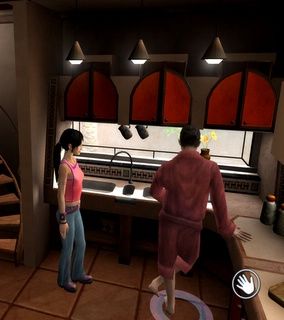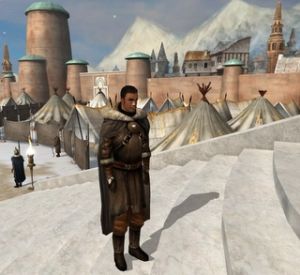 |
|
Digits & Dragons by Greg Allen |
June 2006
Dreamfall: The Longest Journey
It's been a long time since I've sat down with an adventure game. While I'm sure that
plenty are being produced, it has been a while since an adventure game has really gained enough
notice to bring new audiences to the genre. This was certainly the case for me until early this
year when I began to hear rumblings about a soon-to-be-released adventure game, Funcom's
Dreamfall: The Longest Journey.
While I had never played The Longest Journey, the original game in the series, I had
heard from a number of fellow gamers and from various reviews that the storyline and
immersiveness made for a great experience. Needing a break from my normal role-playing and
strategy games, I decided to see what Dreamfall had to offer.
The Journey Begins
Adventure games are fundamentally different from action and trigger games. Action
games are a competition, pitting your skill and reflexes against other humans or the A.I. With
adventure games, it's a whole different world: the experience is all in the journey and the goal is
to unwrap the stories in the world you are exploring.
Playing for the journey itself and not to crush the opposition took a bit of getting used to
for me. At first the dialogue and story background seemed painfully slow, but as the story
progressed I cared less and less about the gameplay and more and more about the characters and
puzzles. Which is exactly what adventure gaming seeks to do.
Dreamfall's predecessor, The Longest Journey, tells the story of April Ryan, an attractive
and capable student who finds out she has the power to shift between her futuristic world of
Stark and the magical world of Arcadia. As April learns more about her powers she realizes she
must restore the balance between the two worlds or both will be destroyed.

It is pretty easy, maybe too easy to see which objects you can interact with
|
Strangely familiar, Dreamfall also begins with an attractive and witty college student,
Zoë Castillo. And although she isn't exactly a shifter like April, Zoë too finds herself traveling
between, and saving, the twin worlds of Stark and Arcadia. Despite these glaring similarities,
Dreamfall moves far beyond what was established in The Longest Journey and ties together
April, Zoë, and an entirely new character, the apostle/assassin Kian.
While there are absolutely no gameplay differences between the characters, the weaving
of these three storylines keeps the suspense high and the pace fairly quick. I'll leave it to you to
unwrap the entire story, but you'll find a great mix of tech and magic as you explore the
connections between these characters.
The Details
Attention to detail is critical in a game that is partly meant to be a dramatic production.
Dreamfall's dialogue (both the content and the presentation) are very well done and are critical in
keeping the story flowing. As good as the dialogue is, though, it was Zoë's talking to herself that
really had me entertained. Her self-deprecating humor and commentary on her environments can
be hilarious. Like any good humor, the jokes aren't over the top but instead play on the
connection between player and character.
The graphics come from a Norway-based development team, so I wasn't expecting them
to be as hot as some of the massive-budget US games. I was pleasantly surprised, then, as I saw
the dynamic lighting and shadows, reflective water and ice, and gorgeous buildings and skies.
For a game where immersion in the story is the goal, this really paid off. Running though
Arcadia, I often found myself stopping and staring at the dazzling world around me.

Both characters and environments are beautiful
|
One more detail that really impressed me was the overall stability of the game. As much
as I have raved about Oblivion over the last few months, it definitely had some major issues with
crashing. Dreamfall, however, has not given me a single problem. No stuttering framerates
(even on maxed detail), no crashes, and no bugs that have slowed me down. I guess I really
shouldn't find this so surprising, but the stability of the game really impressed me and I think this
is more a reflection of the US game development/production cycle than anything else. Kinda sad.
Stick to the Basics
Strangely, the biggest complaints I had about this adventure game were when the game
tried to include elements of the games I play more often. Most adventure games involve little or
no action-based combat, and while I enjoy combat in RPGs, Dreamfall has one of the most
ridiculously bad combat systems ever invented.
Battles are reminiscent of an 80s arcade fighter where you have just two buttons (strong
hit and weak hit) and dodging does practically nothing. The only way to consistently win is to
go around your enemy in circles and attack after he misses. Not only is this gimmicky and
boring but it really takes away from the adventuring feel of the game. Leave combat to action
games; nobody is playing Dreamfall looking for a fight.

The sneaking system is mediocre but does bring some variety to gameplay
|
Given my inexperience with a lot of recent adventure games, I don't know whether
Dreamfall's pseudo-agency is the exception or the norm. Although you are given choices in
dialogue and action, as far as I could tell all paths lead in the same direction. Having different
possibilities is nice, but Dreamfall plays like a choose-your-own-adventure book where any time
you get a choice, every option still leads to the same page. Kind of defeats the purpose, eh?
Acclaim to Aspyr
There is no doubt that Dreamfall is a success. I was drawn into the story, captivated by
the characters, and awed at the attention to detail that this adventure game brought. I don't know
if it made me an adventure game convert, but I certainly gained a greater appreciation for the
genre.
Dreamfall does what very few games can do: please the die hard followers as well as the
newcomers. If you want to try something new then I wholeheartedly recommend this adventure.
Dreamfall tells a story more clearly and more cleverly than any game I can remember!